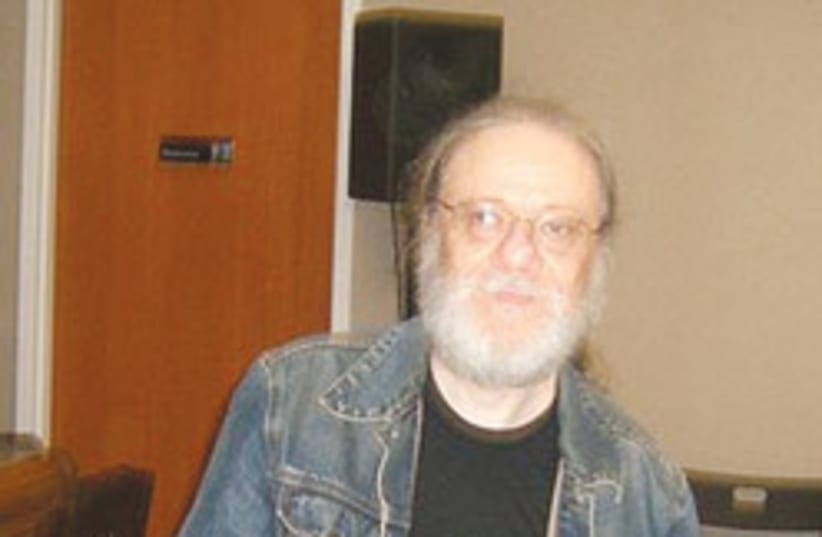The Jewish pioneers of punk
Tommy Ramone, Chris Stein, Lenny Kaye, Dick Manitoba all tribe members.
By ELEO GIOSUÈBLEO GIOSUÈ SOLOMONT
Four legends of punk rock gathered last week to reminisce, to relive and yes, to kibbitz about the early days of punk.
"People don't associate punk rock and Jews," said Tommy Ramone, born Támás Erdélyi in Budapest, who took the stage with three other Jewish rockers to expound on the unlikely connection. Joining him at the YIVO Institute for Jewish Research were other "Loud Fast Jews," as they were described on a flyer for the June 11 event: Chris Stein of Blondie; Lenny Kaye, who still records with Patti Smith; and Handsome Dick Manitoba, born Richard Blum, the lead singer of the Dictators and onetime proud owner of a massive Jewfro.
That few know the four are Jewish should come as no surprise, really. "We approach rock and roll as our religion, as our spiritual outlet," Kaye said, while confessing his fondness for minor chords found in some Jewish songs. "Ma Nishtana is a really great hit," he said, prompting Ramone to hum a few bars and Manitoba to belt out a rock-and-roll version of the Pessah tune.
In no uncertain terms, Loud Fast Jews was a departure from the kind of event normally held at the Jewish institute, according to YIVO's director of cultural affairs, Harold Steinblatt, who envisions similar panels on bluegrass and folk music. But the night's curator, Richard Bienstock, a senior editor at Guitar World, noted that with "anything that starts here" in New York, "there's a good chance Jews are involved."
Indeed, the Jewish influence in early punk rock is well documented in Steven Lee Beeber's 2006 book, The Heebie-Jeebies at CBGB's, which talks about the middle-class Jewish kids from Queens and Brooklyn who made up the early New York punk scene.
For their parts, Ramone, Manitoba, Stein and Kaye conveyed different connections to Judaism. For Manitoba, his bar mitzva was a pivotal moment in his career as a performer. "I was absolutely terrified," he said. "I don't think it was a rousing success from any angle," he admitted, but pointed out with glee that with his bar mitzva money, "I bought a pound of pot."
Kaye also said he grew up with "a strong sense of being Jewish," though Stein - who cofounded Blondie in 1975 with Deborah Harry - said his connection was minimal. "I'm really hard pressed to say what being Jewish means to my rock and roll stance," he said.
Indeed, all four said the New York scene - their Brooklyn and Bronx neighborhoods, CBGB's - influenced them personally and artistically. But yes, they were influenced by other Jewish entertainers of the day - from Ed Sullivan to Broadway composers to performers in the Catskills. "All that shtick was Jewish," said Ramone, "and to me that was very important."
"I'm sure what I spit back has a little Shecky Green in it," said Manitoba.
DESPITE THE joking and the schmoozing, the aging rockers acknowledged some demons, like the fascist images employed by more than one of them. Ramone, whose family fled Budapest during the Hungarian Revolution and who has relatives who died in the Holocaust, acknowledged it was a "very complex" dynamic.
For him, referencing "forbidden things, horrible things" was an artistic venture, he said. "There's a cathartic effect when you take your deepest fears, your deepest anger, your deepest hurt," he said, and "try to get a grasp of it and make humor out of it or make something that's in an artistic sense, something transformed."
Manitoba insisted the imagery was not meant to offend. "It would hurt me if somebody was hurt because we had a song called 'Master Race Rock,'" he said.
Seeing how few fans and journalists knew they were Jewish, the four said they experienced little anti-Semitism firsthand. "I sort of experienced the opposite," said Stein, who recalled a German journalist who accused him of using swastikas in his show. "Nobody knows I'm Jewish," he said.
Indeed, Ramone admitted, "I was not anxious to let people know I was Jewish," though he said he was not hiding it.
For Kaye, reimagining yourself was the norm back then. "You weren't really looking to be who you were," he said. And yet, he recalled the profound experience of visiting Israel and performing in Tel Aviv in 1999. "I was surprised by how funky it was," he said.
He said he found a commonality in the music of Jews and Arabs during that trip. "It's one of the saddest things in my life to see what happens over there. I'm not taking sides… There are two wrongs happening over there," he said to rousing applause.
Manitoba insisted he wanted to pass down his Jewish heritage to his son, who has the middle name Koufax, after the baseball player who wouldn't pitch in the World Series on Yom Kippur. "If nothing else," Manitoba said, "I gotta give him this stickball, baseball, egg cream, bagels-and-lox kind of culture that means so much to me."

